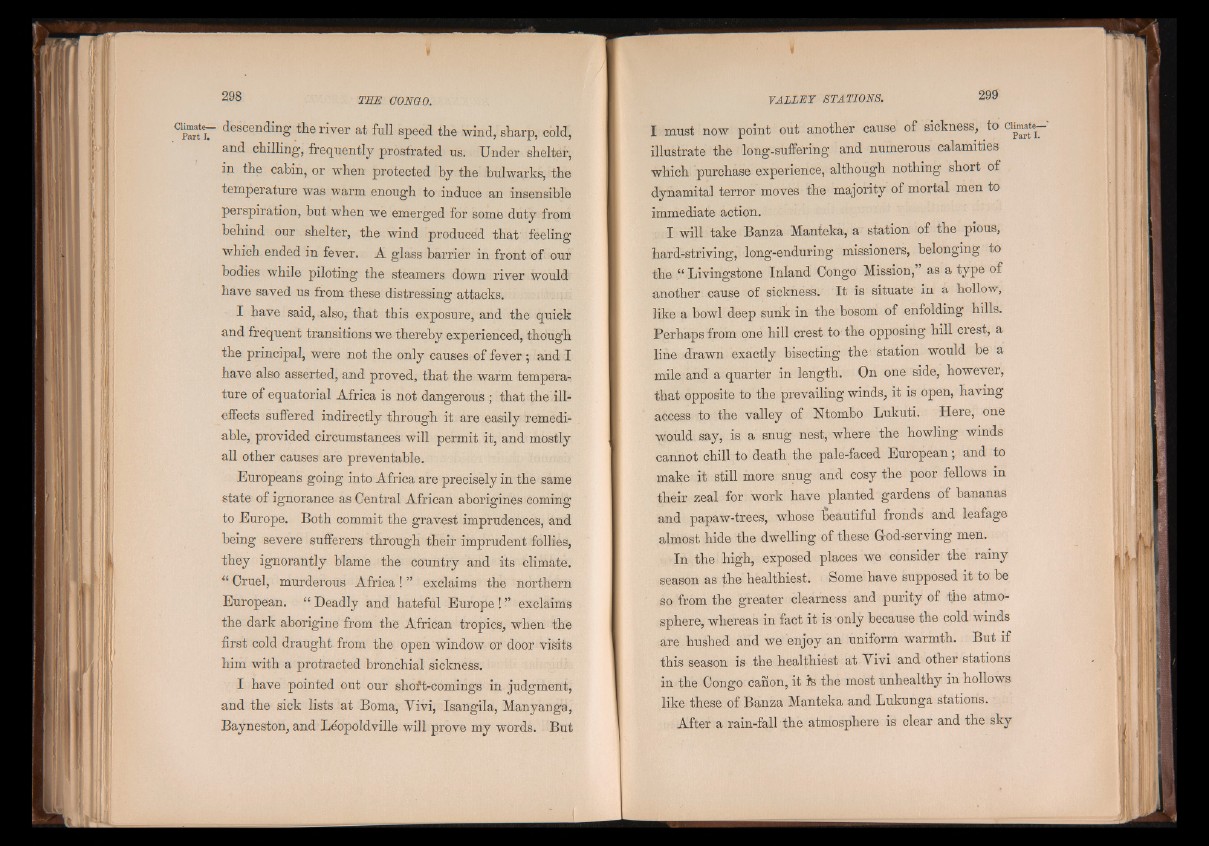
^PartiT" ^esceil^ nS river at full speed the wind, sharp, cold,
and chilling, frequently prostrated us. Under shelter,
in the cabin, or when protected by the bulwarks, the
temperature was warm enough to induce an insensible
perspiration, but when we emerged for some duty from
behind our shelter, the wind produced that feeling
which ended in fever. A glass barrier in front of our
bodies while piloting the steamers down river would
have saved us from these distressing attacks.
I have said,.also, that this exposure, and the quick
and frequent transitions we thereby experienced, though
the principal, were not the only causes of fever ; and I
have also asserted, and proved, that the warm temperature
of equatorial Africa is not dangerous ; that the ill-
effects suffered indirectly through it are easily remediable,
provided circumstances will permit it, and mostly
all other causes are preventable.
Europeans going into Africa are precisely in the same
state of ignorance as Central African aborigines coming
to Europe. Both commit the gravest imprudences, and
being severe sufferers through their imprudent follies,
they ignorantly blame the country and its climate.
“ Cruel, murderous Africa! ” exclaims the northern
European. “ Deadly and hateful Europe ! ” exclaims
the dark aborigine from the African tropics, when the
first cold draught from the open window or door visits
him with a protracted bronchial sickness.
I have pointed out our shoft-comings in judgment,
and the sick lists at Boma, Vivi, Isangila, Manyanga,
Bayneston, and Leopoldville will prove my words. But
I must now point out another cause of sickness, to cHmate-
illustrate the long-suffering and numerous calamities
which purchase experience, although nothing short of
dynamital terror moves the majority of mortal men to
immediate action.
I will take Banza Manteka, a station of the pious,
hard-striving, long-enduring missioners, belonging to
the “ Livingstone Inland Congo Mission, as a type of
another cause of sickness. I t is situate in a hollow,
like a bowl deep sunk in the bosom of enfolding hills.
Perhaps from one hill crest to the opposing hill crest, a
line drawn exactly bisecting the station would be a
mile and a quarter in length. On one side, however,
that opposite to the prevailing winds, it is open, having
access to the valley of Ntombo Lukuti. Here, one
would say, is a snug nest, where the howling winds
cannot chill to death the pale-faced European; and to
make it still more snug and cosy the poor fellows in
their zeal for work have planted gardens of bananas
and papaw-trees, whose beautiful fronds and leafage
almost hide the dwelling of these G-od-serving men.
In the high, exposed places we consider the rainy
season as the healthiest. Some have supposed it to be
so from the greater clearness and purity of the atmosphere,
whereas in fact it is only because the cold winds
are hushed and we enjoy an uniform warmth. But if
this season is the healthiest at Vivi and other stations
in the Congo canon, it fe the most unhealthy in hollows
like these of Banza Manteka and Lukunga stations.
After a rain-fall the atmosphere is clear and the sky